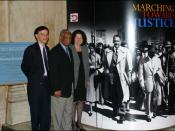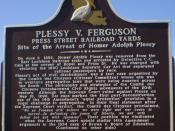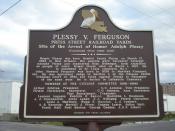Is Separate Equal?
The Reversal of Plessy V. Ferguson
Imagine that you are a pre-teen child walking into school for the first time. As you walk through the front doors to your new second home, other children stare you down from every angle. Children spit on you and others knock your books out of your hands. After you reach the end of the gauntlet, an adult with the aura of a prosecutor confronts you. A frown drapes your face as you are told that you are not allowed to be there, you have to go to another school with less qualified teachers, text books that are decades old and very much out-dated, and a facility that is run down and close to being condemned. Countless numbers of students faced that fear year after year. Segregation of race in the public school system used to be the norm. Many African Americans laid down to the opposition.
They rode in the back of the bus, drank from separate water fountains, ate at the "other" restaurant, and sat in the "black only" car on the trains. Slavery being abolished was just the tip of the iceberg on the legislation that needed to be discussed in order to provide African Americans with their equal rights.
"On June 7, 1892, a 30-year-old shoemaker named Homer A. Plessy refused to leave the whites-only car on a train in Louisiana" (Price). After Plessy decided that he was not going to remove himself from the whites-only car, he was arrested and although he was only one-eighth black. Apparently, under Louisiana law, he was still black. Judge John Ferguson convicted Plessy citing the Fourteenth Amendment. After the conviction in the Louisiana court system, Plessy filed an appeal with the United States Supreme Court.
The argument on behalf of Homer...



Nice essay
This is a very nice essay... it's very thorough and comprehensive... I think this a well-written paper. You guided the paper with great strength and nice use of intext documentation as textual evidence...
4 out of 4 people found this comment useful.